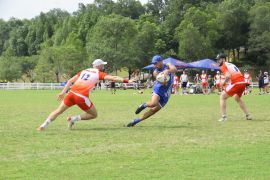Resilient Samoa emerges from eventful year
3 Sep 2020 @ 9:45 UTC
With the global focus rightly on the unprecedented impact of COVID-19, for Samoa, the pandemic followed hot on the heels of a measles epidemic that gripped the island nation in 2019. Despite the challenges, the resilient Samoa Touch Rugby Incorporated is working hard to return its talented players to the field of play.
Tragically the epidemic in 2019 took the lives of 81 people, most of them babies and young children, and infected more than 5,600 people. The combined effect of the epidemic followed by COVID-19, “Have really put things on hold” for the sport of Touch in Samoa according to Michael Wulf, President of Samoa Touch.
That said, the government of Samoa have started to lift some of the social restrictions, “So we are just trying to get the clubs back into it” said Lote Lima Secretary of Samoa Touch.
The impact of the pandemic and the epidemic were significant subjects of discussion when Michael, Lote and Michael Rasmussen, who played for Samoa in the Mixed at the 2019 World Cup, recently spoke with Adam Collins from the Federation Of International Touch (FIT) for a Set of 6.
The need for more school access
Aside from the dealing with the fallout from the epidemic and the pandemic, on the development front, the major challenge for Touch in Samoa is having to compete with other sports such as rugby union, rugby league, netball and soccer for a relatively small pool of participants, and the fact that at this stage Touch has limited access to schools.
Samoa is a country located in the South Pacific Ocean approximately halfway between Hawaii and New Zealand. Apia is the capital city, and the population of the country is about 200,000.
Colonial powers have played a part in the history of this devoutly Christian nation. At the start of World War 1, New Zealand sent the Samoan Expeditionary Force to take control of what had been the German territory of Samoa. New Zealand controlled what was then called Western Samoa until 1962, which explains the popularity of the rugby codes. At this juncture, Samoa became the first South Pacific island to gain independence. The country officially changed its name to Samoa in 1997.
More coaches will fast-track Samoan Touch
Samoa has also faced the difficulty common to many emerging Touch nations, in not having enough local coaches and referees. According to Michael Wulf, there are plans in place to bring in more offshore coaches and referees, to help address this issue.
Current Samoan international Michael Rasmussen has seen the positive effect of offshore mentoring on Samoan coaches. “Local guys have a lot of flair, and sometimes it is hard to contain, but if they learn some of the Australia and New Zealand structures, it can take them to a new level really quickly.”
There is also a concerted effort to try to increase the number of international matches played between World Cups. Touch is played at the Pacific Games, which is held every four years. A Pacific Touch Cup tournament is also scheduled for 2021. Closer bilateral ties with Fiji are also being explored, to allow for more cost-effective joint development, according to Michael.
Expatriate pride in Samoan heritage
One major positive for the future of Touch in Samoa is the relatively large communities of people with Samoan heritage in New Zealand and Australia. There are nearly 175 000 people of Samoan culture in New Zealand and at least 75 000 in Australia, which combined, is more than the population of Samoa itself.
About half of the Samoan Men's Open team at the last World Cup were local Samoan players, and the other half were living and playing in New Zealand or Australia. There was strong ex-pat representation in the other two Samoa teams at Malaysia 2019 as well.
Meanwhile, the Queensland Samoa Touch Association has sent teams to the island, while other Samoan heritage teams from Sydney and New Zealand have undertaken tours. As Michael Rasmussen said, “Bringing that experience to the local players can help lift their game massively.”
Limitless potential to succeed
One thing that Michael, Lote and Michael all agree on is that the future is so bright for Touch in Samoa. Think about it? By combining the islander’s raw natural ability for Touch with improved coaching and refereeing, and the continuing support of expatriate players, and the sky is the limit for Samoa Touch.

